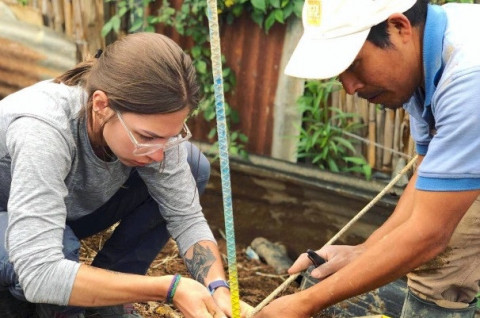
GCED Basic Search Form
Quick Search
현재 위치
뉴스

2 November 2023
The Prize honours exceptional projects and programmes undertaken by institutions, organizations or other entities in the field of education for sustainable development.
The 2023 UNESCO-Japan Prize on education for sustainable development has been awarded to: Long Way Home from Guatemala for their project ‘Hero School’, Kanazawa University from Japan for their project ‘Intergenerational Learning on ESD to revitalize remote communities inside Japanese UNESCO Biosphere Reserves and Geopark’ and the Zimbabwe Institute of Permaculture from Zimbabwe for their project ‘SCOPE’. Chosen by an international jury, the three initiatives showed outstanding work and dedication in incorporating sustainability into their education systems and engaging their communities.
Long Way Home, Guatemala
Long Way Home was chosen for its project “Hero School”, which aims to provide affordable and high-quality education to marginalized communities while integrating sustainable values into lesson plans and curriculum. Such sustainable values include climate change mitigation, improved access to quality education and clean water, food security, gender equality, and improved human rights.
Students actively contribute to the community's well-being by constructing essential living conditions and structures such as smoke-reducing stoves, drinking water cisterns, safe waste disposal latrines, landslide-preventing tire retaining walls, and earthquake-resistant safe housing.
The project garnered the jury's recognition for its transformative impact and educational approach. Their efforts in empowering students, training teachers in sustainable values, and addressing economic and environmental challenges in a holistic way were commended, particularly in providing marginalized communities with knowledge and resources for sustainable self-reliance.
Kanazawa University, Japan
Kanazawa University in Japanhas successfully contributed to the revitalization of remote communities with a decreasing and aging population, in Japan's UNESCO Biosphere Reserves and Geopark.
Through their project “Intergenerational Learning on ESD to revitalize remote communities inside Japanese UNESCO Biosphere Reserves and Geopark” they have fostered` intergenerational bonds and collaborated between local villagers, and students, transforming each resident into an "educator" and the entire village into a living learning hub.
Notably, the project garnered recognition from the jurors as an exemplary model of intergenerational and intercultural learning, contributing to the rejuvenation of rural areas in Japan. The jurors commended their promotion of sustainable practices among students and their practicality levering the knowledge of residents to spur eco-entrepreneurship and create new job opportunities.
Zimbabwe Institute of Permaculture, Zimbabwe
The SCOPE Programme, run by the non-profit organization Zimbabwe Institute of Permaculture, through their whole school approach – integrated land use design considers schools as self-contained ecosystems that are addressed holistically. Making all the school land productive, transforming degraded and ornamental spaces into productive food gardens that meet local needs.
Students, teachers, and the community all work together to cultivate and harvest a variety of crops, improving food quality and lowering dependency on synthetic nutrients. Facilitating an inclusive transgenerational learning process that allows stakeholders to collaborate on the development of their school and its teaching and learning environment.
The international jury noted SCOPE's outstanding contributions to sustainable resource management. Sustainable techniques such as seed conservation, crop diversity, mulching, rainwater harvesting, and school planting were commended for revitalizing school grounds into thriving self-sustaining agricultural and learning environments.
About the UNESCO-Japan Prize on ESD
Funded by the Government of Japan, the prize was established by UNESCO’s Executive Board in October 2014, and was renewed in November 2019 for a period of six years (2020-2025) with a biennial cycle.
Selection criteria looks for strong potential in transformation, innovative quality and ability to embrace all three dimensions of sustainability: The economy, society and the environment.
Laureates of the 2023 prize were recommended by an independent international jury. The three laureates were selected among the 92 nominations submitted by the governments of 51 Member States and 7 organizations in official partnership with UNESCO.
